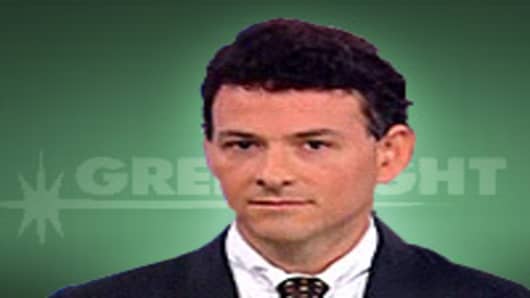Near-zero interest rates represent a dangerous long-term policy and the Fed should raise rates in order to help the economy and provide much needed income for pensioners, David Einhorn, president of Greenlight Capital told CNBC Monday.
"There are people who save money who can't speculate in the stock market," said Einhorn, whose hedge fund has $7 billion under management. "They're at an age where that kind of risk doesnt make sense anymore, and they're getting nothing.
"If we raise rates a bit, they might have some more income, and that could actually help the economy," Einhorn said.
Einhorn added that keeping rates low only helps banks and the federal government.
Einhorn went on to say that regulators have learned the wrong lessons from the financial crisis and the failure of Lehman Brothers. Back in 2008, Einhorn successfully foresaw the Lehman collapse, shorting the investment bank's stock leading up to its downfall.
"You've institutionalized the idea of 'too big to fail,'" he said. Einhorn warned that continually bailing out struggling entities—whether they be American banks or European countries—is bound to have long-term consequences.
"The policy only works until something comes along that is too big to bail, such as a major economy like Spain," Einhorn said.
Einhorn added that the current system calls for countries with good credit to support those who lack it until somebody runs out of credit, which will ultimately lead to another systemic crisis.
The system also breeds "a moral hazard among the banks," Einhorn aruged. He explained by saying the Fed's repeated bailouts, during both the current crisis and previous ones, have created perverse incentives for market players to take on excessive risk.
"It's kind of like if you make a safer car, people drive faster," said Einhorn. "And as you bail these things out, people realize that they can take on more risk."
Money Market Problems
Einhorn also critisized the lack of effective reforms made in the money markets space, which he calls "essentially unregulated bank deposits that can never break a buck."
He called for enacting reforms that would allow these investments to lose money. Einhorn said the current system has resulted in "suckers" who put their money in FDIC-insured deposits likely earning up to 20% less than their counterparts who invested in money market funds.
Einhorn said, "the basic idea that money markets yield higher amounts than bank deposits is a problem that financial regulators need to fix."
Einhorn added that another financial crisis is unlikely to again originate from problems with the banks, but rather the actions of governments. He singled out systemic weaknesses in monetary and fiscal policy as the most likely culprits of the next crisis.


